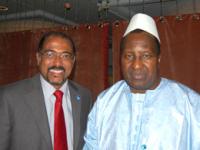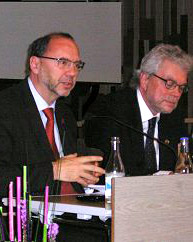
Executive Director of UNAIDS Mr Michel Sidibé participated in a panel on global health challenges, 22 October 2009, Stockholm.
Credit: UNAIDS
The European Development Days opened yesterday in Stockholm by Her Royal Highness Crown Princess of Sweden Victoria, the President of the EU Commission José Manuel Barroso and the Swedish Prime Minister Fredrik Reinfeldt.
The three day event brings together more than 1500 organizations and 400 individuals from the development community to discuss how to make development aid more effective, and it aspires to build a global coalition to achieve the Millennium Development Goals (MDGs) for 2015.
The European Development Days are hosted jointly every year by the European Commission and the EU presidency, with this year’s event being the fourth edition.
The Executive Director of UNAIDS Mr Michel Sidibé participated in a panel on global health challenges, which explored ways of making the world a healthier place, despite the ailing state of the global economy.
Mr Sidibé emphasized that the world is lagging behind when it comes to HIV prevention, outlining key barriers to halting the spread of HIV including investing resources with populations who are criminalized and marginalized.
“We have effective prevention interventions – however we are not convincing enough decision-makers to invest sufficiently in them”.
UNAIDS Executive Director Michel Sidibé
“We have effective prevention interventions – however we are not convincing enough decision-makers to invest sufficiently in them”, Sidibé continued, stressing that success will require building an HIV prevention movement with the grassroots to over come political inertia.
He also expressed the need for programmes to “address sexuality and gender inequality in frank, open ways, keeping up with a changing epidemic.”

Executive Director of UNAIDS Mr Michel Sidibé meet with the former President of Mali, Mr Alpha Oumar Konaré during the European Development Days, 22 October 2009, Stockholm.
Credit: UNAIDS
The session also focused how to meet the health related MDGs, and Mr Sidibé spoke of the need to take the AIDS response out of isolation saying that policy-makers should leverage the energy and creativity of the AIDS movement to deliver on the AIDS+MDG agenda.
Lluis Riera, Director for Development Policy at the European Commission's Directorate General for Development, Michel Kazatchkine Executive Director of the global fund to Fight AIDS, TB and Malaria and Anders Nordström, Director General of the Swedish International Development Cooperation Agency (Sida) also addressed the session.
The Global Health Challenges session was a joint initiative of UNAIDS, The Global Fund to Fight AIDS, TB and Malaria, the GAVI Alliance, the Stop AIDS Alliance, and AIDS Accountability International.

Executive Director of UNAIDS Mr Michel Sidibé with Mr. George Soros during the European Development Days, 22 October 2009, Stockholm.
Credit: UNAIDS
While in Sweden, Mr Sidibé also took the opportunity to meet with Swedish non-governmental organizations (NGO) engaged in the AIDS response. Among them Noah's Ark, an NGO that has been involved in the fight against HIV since 1986, as well as representatives of the Swedish Network of People Living with HIV.
The European Development Days is hosted by the current EU President, Sweden and will conclude on 24 October.












